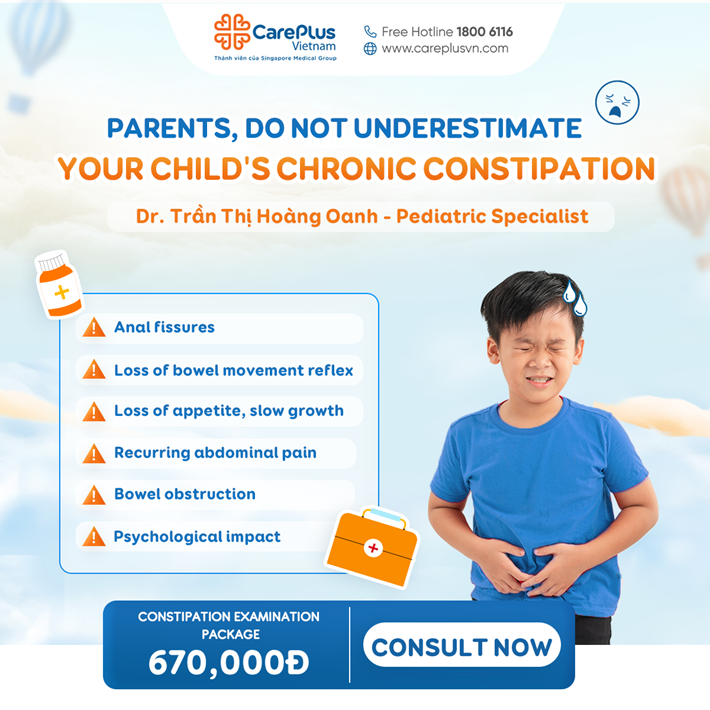Don’t Overlook Your Child’s Prolonged Constipation!
If your child’s constipation is lasting longer than expected and affecting their health, growth, and daily life, you’re probably feeling worried and frustrated. Have you tried everything but still haven’t solved the problem? Let’s learn more about prolonged constipation and important treatment tips from Dr. Tran Thi Hoang Oanh - Pediatric Specialist at CarePlus!

10/8/2024 11:29:50 AM
What is Constipation?
Constipation is a common issue in children. If your child is constipated, they may experience:
- Going more than 3 days without a bowel movement
- Hard, large, or pellet-like stools, discomfort, and even crying when trying to pass stool
- Blood in their stool
Since constipation often doesn’t seem like a serious issue, parents might not pay enough attention to it. However, untreated prolonged constipation can lead to long-term health problems.
Consequences of Prolonged Constipation
Constipation over time can cause several health issues for your child. Here are some of the key risks to be aware of:
- Anal fissures, hemorrhoids: Hard stools can cause painful anal fissures, and prolonged straining can lead to hemorrhoids, which may result in bleeding and discomfort.
- Poor appetite and slow growth: Constipation can make your child feel bloated and less interested in food, potentially leading to chronic malnutrition.
- Loss of bowel reflexes: Prolonged constipation may weaken your child’s natural bowel reflexes, increasing the risk of recurrent abdominal pain and even colorectal cancer later in life.
- Holding in stools: If passing stools is painful, your child may start holding it in, making the constipation worse. This creates a vicious cycle that’s hard to break without proper intervention.
- Chronic abdominal pain: Constipation can cause your child to experience frequent stomach pain due to the buildup of stools in the intestine.
- Behavioral changes: Prolonged discomfort from constipation can make your child irritable and upset.
- Bowel obstruction: Severe constipation can lead to bowel obstruction if the stool becomes too hard to pass.
- Toxic megacolon: When stools remain in the intestine for too long, they can release toxins, causing inflammation of the colon and repeated infections.
Tips for Caring for a Constipated Child
Here are some important things to keep in mind when managing your child’s constipation:
- Dietary changes: Constipation often happens when children don’t drink enough water or eat enough fiber, or when their routine changes (like starting school or going on vacation).
- Stick to prescribed medications: Even if your child seems better after starting treatment, don’t stop medication without your doctor’s approval. Stopping too soon can cause constipation to come back.
- Avoid frequent use of enemas: Overuse of enemas can make your child afraid to use the bathroom and dependent on them to pass stools.
If you notice any signs of constipation in your child, it’s important to see a doctor for early diagnosis and proper treatment to prevent long-term effects on your child’s physical and emotional health.
You can always reach out to CarePlus to find the root cause and receive detailed advice on the best way to care for and treat your child’s constipation.